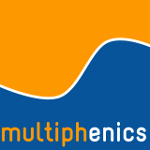multiphenics is a python library that aims at providing tools in FEniCS for an easy prototyping of multiphysics problems on conforming meshes. In particular, it facilitates the definition of subdomain/boundary restricted variables and enables the definition of the problem by means of a block structure.
multiphenics requires FEniCS (>= 2018.1.0, python 3) with PETSc and SLEPc.
Support for FEniCSx is available in the new multiphenicsx library. New and existing users of FEniCS and multiphenics are encouraged to gradually move to FEniCSx and multiphenicsx.
Simply clone the multiphenics public repository
git clone https://github.com/multiphenics/multiphenics.git
and install the package by typing
python3 setup.py install
If you want to try multiphenics out but do not have FEniCS already installed, you can pull our docker image from Docker Hub. All required dependencies are already installed. multiphenics tutorials and tests are located at
$FENICS_HOME/multiphenics
Several tutorials are provided in the tutorials subfolder.
- Tutorial 01: block Poisson test case, to introduce the block notation used in the library.
- Tutorial 02: Navier-Stokes problem using block matrices.
- Tutorial 03: weak imposition of Dirichlet boundary conditions by Lagrange multipliers using block matrices and discarding interior degrees of freedom.
- Tutorial 04: computation of the inf-sup constant for a Stokes problem assembled using block matrices.
- Tutorial 05: computation of the inf-sup constant for the problem presented in tutorial 3.
- Tutorial 06: several examples on optimal control problems, with different state equations (elliptic, Stokes, Navier-Stokes), control (distributed or boundary) and observation (distributed or boundary).
- Tutorial 07: generation of restrictions for meshes obtained from gmsh.
- Tutorial 08: how to get the list of degrees of freedom associated to a specific restriction, and use it e.g. to perform local modifications to assembled tensors.
- Tutorial 09: applications of multiphenics to multiphysics problems. We are looking forward to receiving further multiphysics examples from our users!
- Tutorial 10: applications of multiphenics to multiscale problems. We are looking forward to receiving further multiscale examples from our users!
multiphenics is currently developed and maintained at the Catholic University of the Sacred Heart by Dr. Francesco Ballarin in collaboration with Prof. Gianluigi Rozza's group at SISSA mathLab. The financial support of the AROMA-CFD ERC CoG project is gratefully acknowledged. Please see the AUTHORS file for a list of contributors.
Contact us by email for further information or questions about multiphenics, or open an issue on our issue tracker. multiphenics is at an early development stage, so contributions improving either the code or the documentation are welcome, both as patches or pull requests.
- Block matrix support in DOLFIN-X, either as MatNest or monolithic matrices. In multiphenics we always assemble block matrices into a monolithic matrix, and also support possible restriction of the unknowns to subdomains and/or boundaries.
- Mixed dimensional branch in DOLFIN pursues a similar goal to multiphenics. It requires the user the install the corresponding branches of UFL and FFC. In contrast, multiphenics does not require any change to the underlying FEniCS installation.
- multimesh support in FEniCS, which aims at providing support for problems on non conforming meshes. In multiphenics we are rather interested in conforming meshes, with possible restriction of the unknowns to subdomains and/or boundaries.
- CutFEM, an unfitted finite element framework for multi-physics problems that relies on the FEniCS project.
- CBC.Block for the definition of block matrices and vectors in FEniCS.
- Weak imposition of Dirichlet Dirichlet boundary conditions by Lagrange multipliers is a frequently asked question on FEniCS support forums [1, 2]. Some answers provide possible solutions to the problem (e.g. constraining the useless degrees of freedom by DirichletBC), which however may result in an unnecessarily large system to be solved. multiphenics handles subdomain/boundary restricted variables in an efficient and automatic way.
- Please contact us by email if you have other related resources.
If you use multiphenics in your work, please cite the multiphenics website.
Like all core FEniCS components, multiphenics is freely available under the GNU LGPL, version 3.
